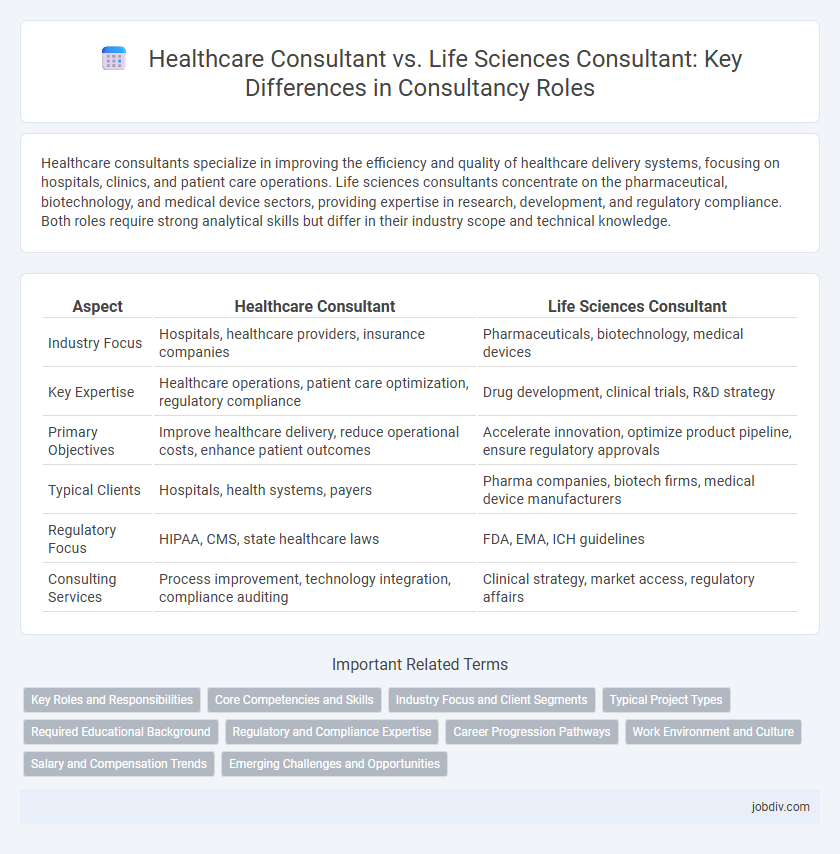Healthcare consultants specialize in improving the efficiency and quality of healthcare delivery systems, focusing on hospitals, clinics, and patient care operations. Life sciences consultants concentrate on the pharmaceutical, biotechnology, and medical device sectors, providing expertise in research, development, and regulatory compliance. Both roles require strong analytical skills but differ in their industry scope and technical knowledge.
Table of Comparison
| Aspect | Healthcare Consultant | Life Sciences Consultant |
|---|---|---|
| Industry Focus | Hospitals, healthcare providers, insurance companies | Pharmaceuticals, biotechnology, medical devices |
| Key Expertise | Healthcare operations, patient care optimization, regulatory compliance | Drug development, clinical trials, R&D strategy |
| Primary Objectives | Improve healthcare delivery, reduce operational costs, enhance patient outcomes | Accelerate innovation, optimize product pipeline, ensure regulatory approvals |
| Typical Clients | Hospitals, health systems, payers | Pharma companies, biotech firms, medical device manufacturers |
| Regulatory Focus | HIPAA, CMS, state healthcare laws | FDA, EMA, ICH guidelines |
| Consulting Services | Process improvement, technology integration, compliance auditing | Clinical strategy, market access, regulatory affairs |
Key Roles and Responsibilities
Healthcare consultants specialize in improving hospital operations, patient care strategies, and regulatory compliance, focusing on optimizing healthcare delivery systems and cost management. Life sciences consultants concentrate on pharmaceutical development, biotech innovation, clinical trials, and market access strategies, ensuring scientific advancements align with commercial and regulatory frameworks. Both roles require expertise in data analysis, stakeholder collaboration, and strategic planning but target distinct sectors within the healthcare ecosystem.
Core Competencies and Skills
Healthcare consultants specialize in optimizing hospital operations, patient care quality, and regulatory compliance, leveraging expertise in clinical workflows and healthcare policies. Life sciences consultants focus on drug development, biotechnology innovation, and market access strategies, utilizing skills in scientific research, clinical trial management, and regulatory affairs. Both roles require strong analytical capabilities and stakeholder communication but differ in sector-specific knowledge and technical expertise.
Industry Focus and Client Segments
Healthcare consultants specialize in optimizing hospital systems, patient care services, and healthcare policies, serving clients such as hospitals, insurance companies, and government health agencies. Life sciences consultants focus on pharmaceutical companies, biotechnology firms, and medical device manufacturers, offering expertise in research and development, regulatory compliance, and market access strategies. Their industry focus directs client engagement, with healthcare consultants targeting service delivery improvement, while life sciences consultants emphasize innovation and product commercialization.
Typical Project Types
Healthcare consultants typically manage projects involving hospital operations optimization, patient care process improvements, and healthcare policy implementation. Life sciences consultants focus on projects related to drug development, regulatory compliance, and biotechnology innovation. Both roles require expertise in data analysis and strategic planning but target different industry-specific challenges and stakeholders.
Required Educational Background
Healthcare consultants typically possess degrees in healthcare administration, nursing, public health, or medical fields, emphasizing clinical knowledge and healthcare systems management. Life sciences consultants often hold advanced degrees in biology, biochemistry, biotechnology, or pharmaceuticals, focusing on scientific research, drug development, and regulatory affairs. Both roles require a strong foundation in their respective disciplines to effectively analyze and improve industry-specific challenges.
Regulatory and Compliance Expertise
Healthcare consultants specialize in navigating regulatory frameworks such as HIPAA and Medicare compliance to ensure healthcare providers meet legal standards. Life sciences consultants provide expertise in compliance with FDA regulations, clinical trial protocols, and pharmaceutical manufacturing practices. Both roles demand deep understanding of regulatory requirements, but healthcare consultants focus more on patient care systems while life sciences consultants emphasize drug development and biotechnology compliance.
Career Progression Pathways
Healthcare consultants typically advance by gaining expertise in hospital management, patient care optimization, and regulatory compliance, often transitioning to roles such as senior healthcare advisor or healthcare strategy director. Life sciences consultants focus on drug development, clinical trials, and biotech innovations, progressing toward positions like project leader in pharmaceutical consulting or R&D strategy consultant. Both paths emphasize specialization and industry certifications, with career growth driven by deepening sector knowledge and leadership in client engagements.
Work Environment and Culture
Healthcare consultants typically operate in hospital systems, insurance companies, and public health organizations, where the work environment emphasizes regulatory compliance, patient outcomes, and cost-efficiency. Life sciences consultants often engage with pharmaceutical firms, biotech startups, and research institutions, fostering innovation-driven cultures focused on R&D, clinical trials, and product commercialization. The cultural difference lies in healthcare's process-oriented, stakeholder-driven atmosphere versus life sciences' fast-paced, science-centric, and collaboration-intensive settings.
Salary and Compensation Trends
Healthcare consultants typically earn an average salary ranging from $80,000 to $120,000 annually, with bonuses and incentives reflecting industry demand and healthcare system complexities. Life sciences consultants command higher compensation, often between $100,000 and $150,000 per year, driven by specialized expertise in pharmaceuticals, biotechnology, and regulatory compliance. Salary trends indicate increasing pay premiums for consultants with advanced scientific credentials and proficiency in digital health technologies.
Emerging Challenges and Opportunities
Healthcare consultants address challenges such as regulatory compliance, patient data security, and value-based care models, focusing on optimizing healthcare delivery and reducing costs. Life sciences consultants tackle innovation-driven demands like drug development acceleration, biotechnology advancements, and navigating complex clinical trial processes. Both roles leverage data analytics and digital transformation but differ in sector-specific expertise and stakeholder engagement.
Healthcare Consultant vs Life Sciences Consultant Infographic

 jobdiv.com
jobdiv.com